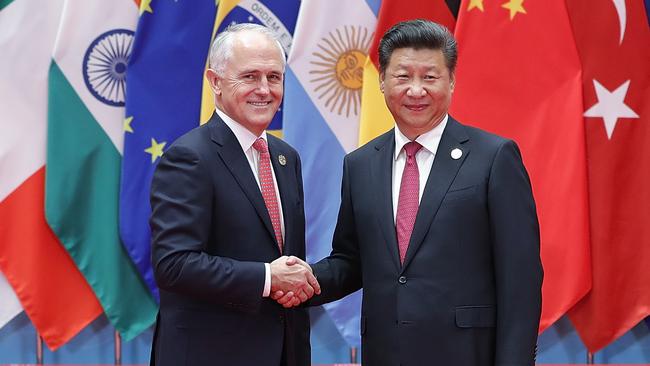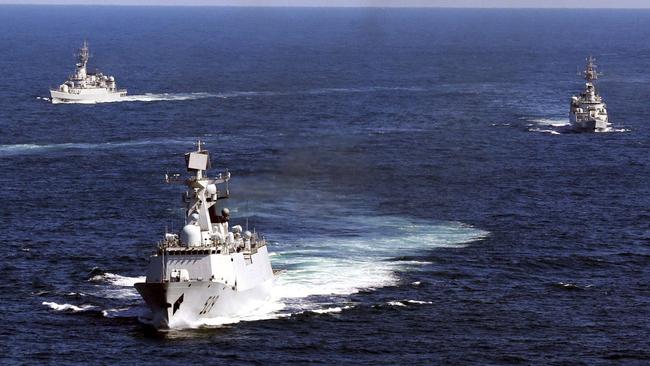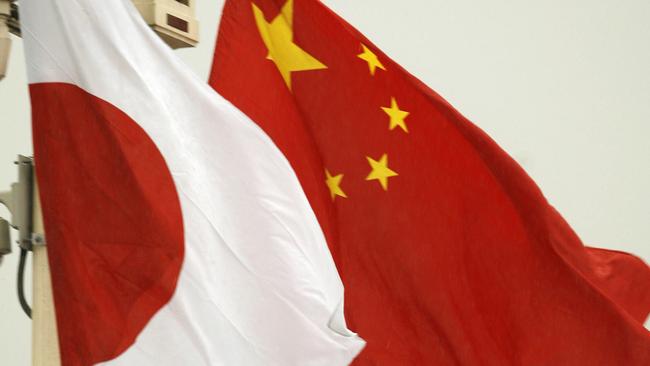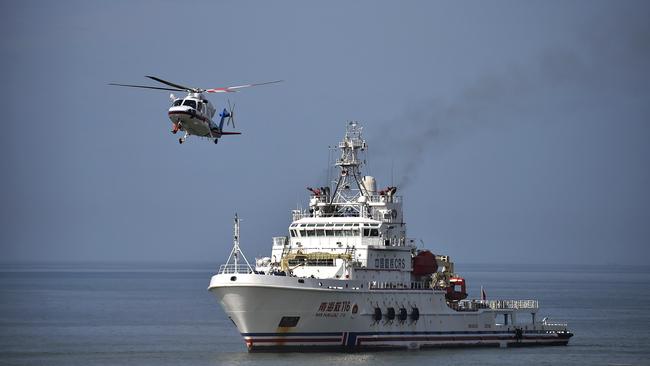Should we be concerned about the East China Sea dispute?
MOST Australians have never even heard of this patch of water, but powerful nations are in a tense face off over it.
MANY Australians rightfully see the South China Sea as one of the most significant and concerning ongoing disputes making global headlines right now.
Just over the weekend, Prime Minister Malcolm Turnbull met with Xi Jinping at the G20 summit, where he publicly backed the United States and urged the Chinese President to peacefully resolve the dispute “in accordance with international law”.
But few people are aware that, just more than 2000km away from the disputed region, a similar conflict is under way between a number of powerful countries.
Some have warned the East China Sea dispute could lead to a world war, while others say — even if things don’t get quite that dramatic — Australia could be forced to make some big decisions if the situation escalates.
WHAT IS THE EAST CHINA SEA?
The East China Sea is a disputed region situated in the middle of China, Japan, South Korea and Taiwan, which is believed to hold valuable natural resources.
In 1995, China discovered an undersea natural gas field in the region, which the disputing countries believe could connect to other natural resources.
Australian National University’s Australia-Japan Research Centre co-director Shiro Armstrong told news.com.au the region has the potential to be a “big problem” if any of the nations made a major faux-pas.
“Both the South China Sea and East China Sea are worrying and potential points of miscalculation,” Dr Armstrong said. “Mistakes can escalate, and both seas involve enough interest by really big players, so they’re the ones to worry about and pay close attention to.”

The East China Sea has caused controversy for several years. China’s vessels have repeatedly sailed into disputed waters, angering the opposing nation.
In 2010, there was a huge controversy between the two countries after a Chinese trawler collided with a Japanese Coast Guard’s patrol boats in disputed territory.
The Japanese government detained Zhan Qixiong, the man operating the Chinese trawler, sparking a national outcry in China that included street protests by fisherman groups, the vandalism of a Japanese private school in Tianjin, and several petitions and letters being submitted to officials calling for Qixiong’s release.
For almost two weeks, these repeated demands went ignored, forcing the Chinese government to cancel official meetings with Japan.
There were even reports China temporarily halted crucial rare earth exports to Japan amid the bitter territorial dispute, although Beijing repeatedly denied claims it blocked these shipments.

COULD THIS SPARK A GLOBAL CONFLICT?
Writing in The National Interest, US security and maritime affairs expert Robert Farley wrote that there were five ongoing conflicts that could spark a third world war.
Syria was listed as one. The South China Sea was another.
The East China Sea dispute was also listed, as its own separate point.
Mr Farley wrote that if a conflict was to erupt between China and Japan, the United States would find it difficult to avoid entanglement.
He argued China could respond by issuing an attack on American military installations across the region, which would “trigger a broader US response, and throw the entire Asia-Pacific into chaos”.
Late last week, Japan requested its largest ever military budget. Concerns over land disputes with China has been cited as one of the key driving forces behind this ramped up spending, although North Korea’s nuclear threat is another significant issue.
Specifically, the government of Prime Minister Shinzo Abe is seeking 5.17 trillion yen (more than $67 billion), in what would be the nation’s fifth-straight annual increase in military spending.
Japan’s proposal would entail developing advanced ballistic missiles that can be launched from ships with record-length ranges, which would be used to help deter China from invading disputed territory.
Reuters reports the Japanese are keen to purchase 11 AAV7 amphibious assault craft produced by British arms giant BAE Systems, among other hi-tech equipment.

The good news, according to Dr Armstrong, is that this isn’t necessarily a provocative move.
“China’s defence spending is already very high,” he said. “Japan is slowly normalising their defence force, most recently by reinterpreting their constitution so that they’re able to join in collective self-defence with other countries. The Chinese objects to this, but I don’t believe it’s a major driver of tension.
“With diplomacy it should contribute to stability.”
It’s important to note that Japan and China are also heavily reliant on one another.
Dr Armstrong said he believes tensions would likely be alleviated given the two countries have such a significant economic relationship.
“They’re completely reliant on each other,” he said. “China relies on Japan’s investment and hi-tech goods, know-how and technology. They’re all very important, so that’s a priority for the Chinese.
“China is concerned with economic security, which Japan provides and vice versa; China is Japan’s largest trading partner, and that’s where Japan’s economic bread is buttered.”
In other words, the countries may have too much at stake if they were to lose their diplomacy over the region.
Pointing to the 2010 Senkaku boat collision, Dr Armstrong concluded “it was messy on both sides, but it didn’t escalate,” attributing this to their trade relationship.
WHERE IS AUSTRALIA IN ALL THIS?
Previous research has found Australians are significantly less aware of even the existence of the East China Sea, let alone tensions brewing there.
Last year, the Australia-China Relations Institute conducted a poll on Australians’ opinions towards disputed territories in the area.
It found that most Australians were unaware of a dispute between China and Japan, or the fact that the United States has committed to defending Japan in the case of an armed conflict over the region.
When asked about Australia’s role, 71 per cent of people said Australia should remain neutral, should Japan, China and the USA go into battle mode.
Most Australians also believe the value of Australia’s trade with China would fall if Australia was to support Japan in conjunction with the USA.

Dr Armstrong advised that we should avoid entering into the conflict at all costs, because we have crucial trade relationships with the countries involved.
After all, China, Japan and the US are our top three international trading partners respectively.
“We’re very important to Japan, China and South Korea,” he said. “It’s often underestimated. We supply more than half of Japan’s strategic raw material needs — iron ore, aluminium, copper — and we’re the single largest energy supplier to Japan as well.
“Australia would want to avoid getting involved in any dispute in the East China Sea, should tensions escalate, because we have important relationships with the countries involved.”
Macquarie University security expert Adam Lockyer previously told news.com.au Australia should remain as neutral as possible.
“Australia’s position is we don’t want to choose,” Dr Lockyer said. “As soon as we’re forced to make a choice, we lose. The guiding principle of Australian foreign policy is ‘Don’t choose between the US and China’. Doing so will either affect our security or our economy — or both.”



